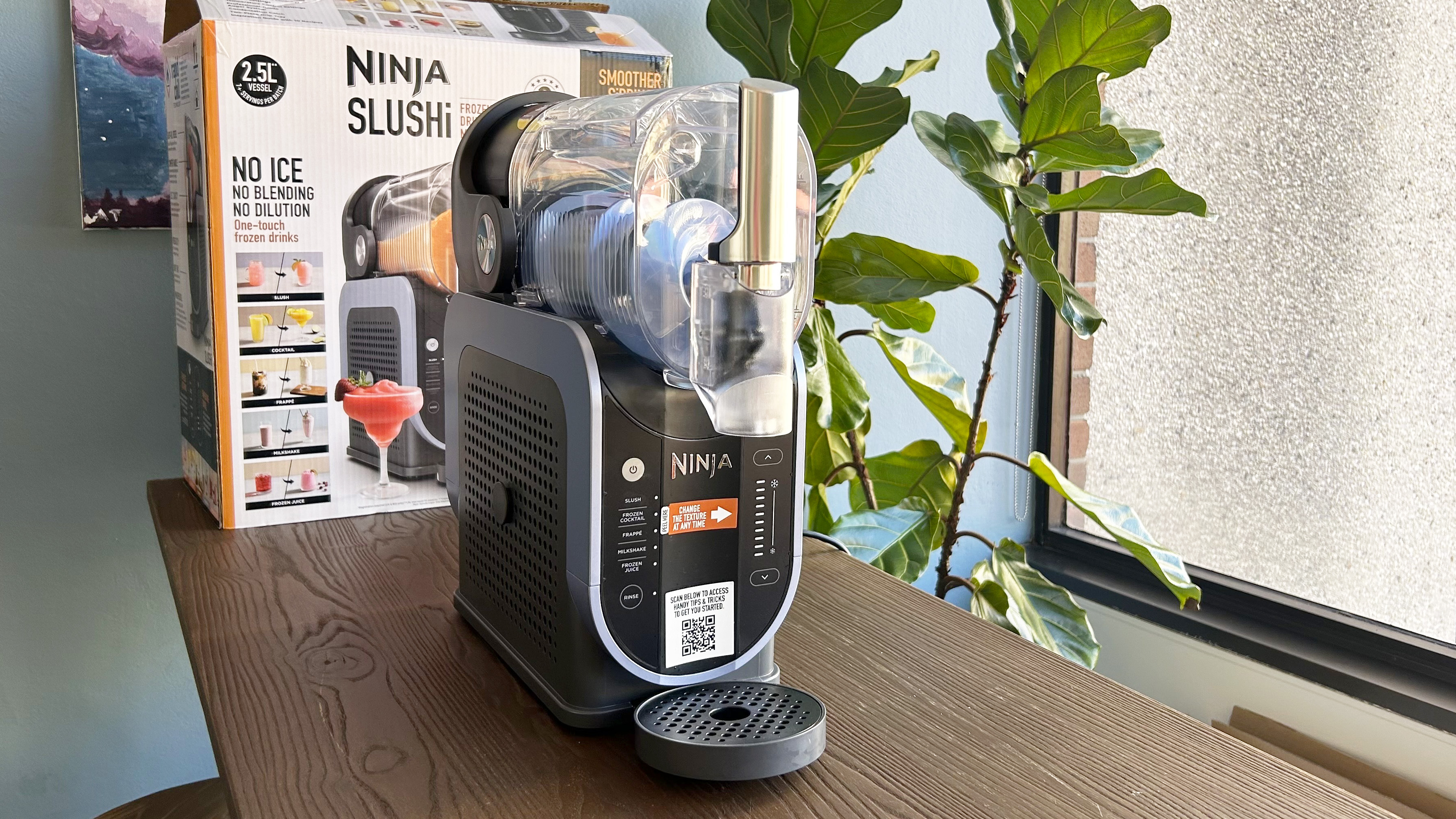Tom's Guide Verdict
Canon's 4-in-1 is fast and affordable, and delivers high-quality prints across the board.
Pros
- +
Blazing-fast text and graphics printing, copying and scanning
- +
Very high image quality
- +
Low cost per page
Cons
- -
Touch screen can be kludgy
- -
Lacks physical buttons
Why you can trust Tom's Guide
The ImageClass MF217w ($142.50) is among the least-expensive laser 4-in-1 devices we've tested. Yet it turned in some of the fastest print, copy and scan times we've measured while delivering very high image quality across the board.
The MF217w isn't as full-featured as Canon's MF229dw, which, unlike the MF217w, has a duplexer for two-sided printing. The MF217w auto document feeder handles fewer sheets (35 versus 50) than its $299 counterpart and has a lower duty cycle (8,000 pages versus 10,000). But the MF217w uses the same generously high 2,400-page-yield toner cartridge, which keeps printing costs low. Both models have a multiuse tray that can accommodate up to 20 envelopes, and a main paper tray that can hold up to 250 sheets.
Design
To control this 4-in-1 without a computer, you use the MF217w's six-line monochrome touch-screen front panel. I found the touch screen to be unresponsive at times, requiring multiple presses of a virtual button to launch a selection. There are no physical buttons for the scan and copy functions (only Home and Back), so you'll have to use the touch screen to make scans or copies.
There is a 10-key pad, but no up/down or OK buttons for making menu selections. As such, I had better luck using the software on a PC.

You may appreciate the MF217w's Quiet Mode button if you have a cramped office and will be working close to the device. Enabling this feature lowers the noise level while printing, and slows printing slightly.
MORE: All-in-One Printers: The Best for Less Than $200
The 35-sheet ADF atop the printer lifts up to reveal the scanner platen. The hinges can support the weight of the lid at about 45 degrees, which is handy if you need to place the unit in a tight spot without full vertical clearance. Below the scanner platen is the output tray, a cavity in the body with a two-piece catch that pulls out and then hinges outward farther. At full extension, it may not be a good fit for a high-traffic area and may be prone to breaking. But small print jobs will not fall to the floor if only the first piece of the catch is extended.
Print Speed
There's no slowing the MF217w. This 4-in-1 was quick to print in all of our tests. It took 18.9 seconds to print a five-page text document, which comes out to 15.9 pages per minute (ppm). That beats the average speed for laser printers by 3 seconds.
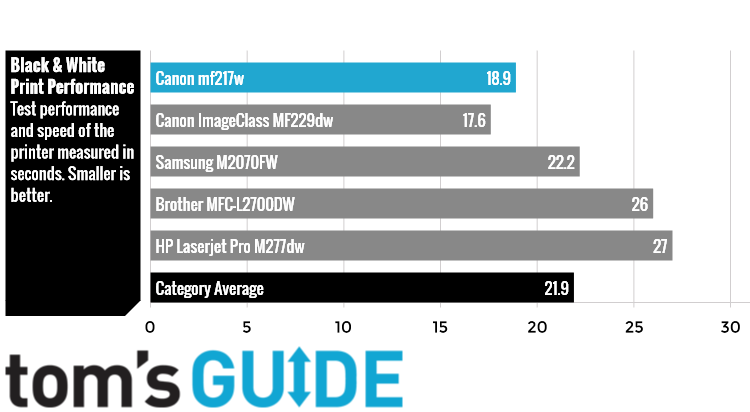
The MF217w was equally speedy with our six-page document of text and graphics, spitting it out in just 29.6 seconds, or 12.2 ppm — 11.1 seconds faster than the average, and roughly half the time of the slowest laser printer we tested, the HP M127fw. The story was no different for a full-page photo: The MF217w printed it in 11.1 seconds, significantly faster than the category average of 16 seconds, and half the time it took the slowest models on this test, including Canon's own MF229dw.
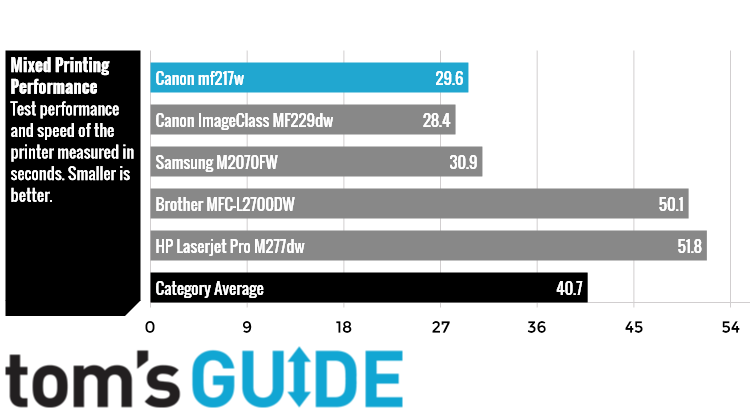
Using the printer's Quiet Mode feature slows things down, but not by much. For a copy that took 14.9 seconds to produce, turning on Quiet Mode added only 2.4 seconds to the process.
Copy and Scan Speed
The MF217w also delivered the fastest copy speeds we've measured, besting the average by 2 seconds. It copied a page in 8.7 seconds — faster than most other models, save for the Samsung M2070FW, which delivered the same time. For this test, we used the default setting, which is text/photo high-speed on the MF217w. Changing the file type settings to photo or text/photo slowed the copy time to 13.2 seconds.
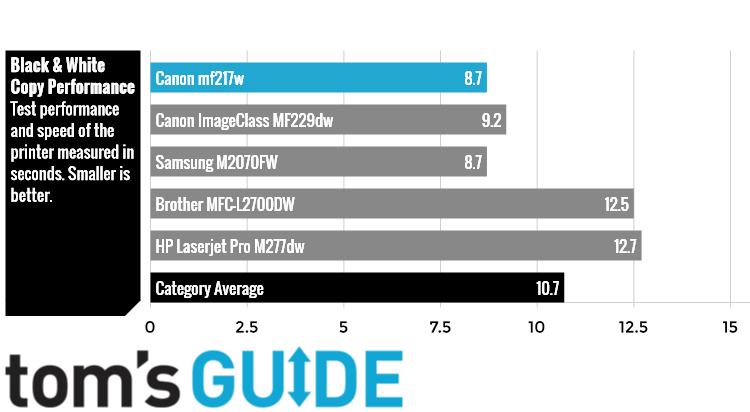
Similarly, the MF217w scanned a color photo to the JPEG format at 600 dpi in 28 seconds — almost 10 seconds faster than the category average. Scanning to PDF format in black and white was equally quick: The MF217w made a scan in 6.7 seconds, or 9 ppm — significantly faster than the average of 11.2 seconds.
Loading up the document feeder with multiple pages will quicken the per-page speed. The unit copied our five-page text document in 22.3 seconds, for a rate of 13.4 ppm. Compare that to the ADF on the HP M127fw, which slowed things down considerably; that machine took more than 53 seconds (5.7 ppm) to copy the same document.
You also can print to Canon's MF217w from an iOS or Android phone, though it's likely to print much more slowly than from a PC. The same six-page document the MF217w printed in less than 30 seconds from a PC took 80 seconds to print from my Android phone.
Print Quality
Fast speeds don't add up to much, of course, if document quality suffers. And the MF217w makes very few trade-offs. I was impressed by the print quality of text and graphics; letter forms were very sharp, and graphics looked detailed, with smooth textures.
Copy quality was similarly high, with accurately reproduced details and textures that were on a par with those produced by the best entry-level all-in-ones we've tested. And, though you might expect copies made with a high-speed setting (the default) to be of lower quality than other selections, I found the impact to be minimal. Text looked just as sharp and smooth, though graphics lacked some detail in dark areas, and midtone transitions weren't as smooth.
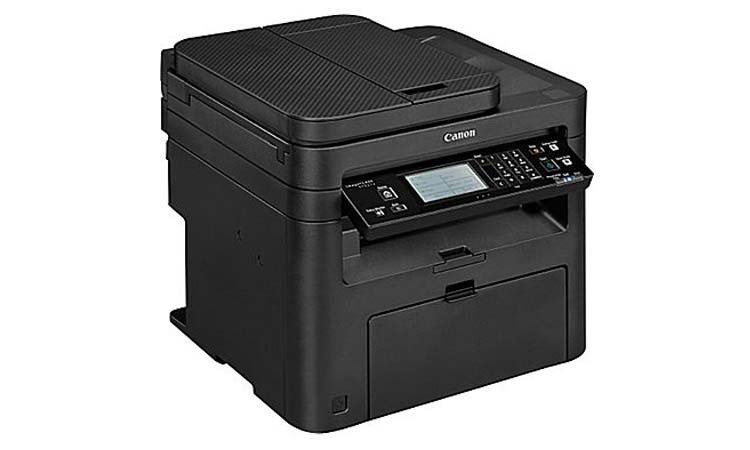
Copying a large photograph definitely required a settings switch to Photo Quality, as you might expect. Using the default setting, the 4-in-1 made copies that were too dark, looked unnatural and lacked smooth midtone transitions. The Photo Quality setting significantly improved shadow detail and midtone transitions.
Scans of photographs captured subtle details in shadow areas that other models missed, and colors looked accurate and natural. Of the laser printers we've tested, only the Canon MF229dw produced such attractive scans of photographs.
Ink/Toner Cost and Yield
There's only one type of toner cartridge you can use with the MF217w, but that's not a downside. It's the same high-yield toner cartridge used by the ImageClass MF229dw. Because of the generous 2,400-page yield of the cartridge, both models deliver the lowest cost per page of the models we tested, at 3.5 cents per page, using a standard-yield cartridge. The average is 4.2 cents.
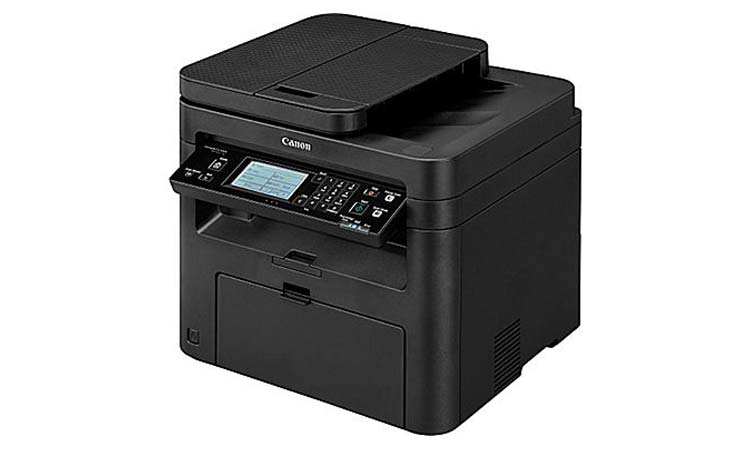
Some models, however, offer a high-yield cartridge that can lower the cost per page further. For example, the Brother HL-L2380DW, whose standard cartridge has a 1,200-page yield, offers another cartridge rated at 2,600 pages that lowers the printing cost to 2.6 cents per page.
Setup
The MF217w is fast out of the gate. It started up in just 10.9 seconds in our testing — roughly half the 21.7-second average.
MORE: Best All-in-One Inkjet Printers - Scan, Copy, Fax
Setting up the printer was a simple matter of removing the toner cartridge and a few pieces of packaging, and sliding the toner cartridge back inside the unit. Putting the MF217w on my wireless network required a little trip to the network setup menu and pressing the WPS button on my wireless router.
Software
Canon's MF Toolbox software suite includes printing, scanning, copying and faxing functions. You can scan to email, OCR software or a folder. I found all of the software's functions easy to use, offering a fair assortment of customizable settings.
The MF217w works with the Canon Print Business mobile app for Android and iOS, though that isn't mentioned in the manual. I was able to open and print files from my phone. I could also scan files and use the capture feature, which is a simple matter of taking a picture of a document within the app, cropping it and printing it. The MF217w does not support the more sophisticated Canon Mobile Scanning for Business platform.
Bottom Line
The MF217w has plenty to offer a small office. It's among the fastest models we've tested at every function and delivers very high image quality across the board. Plus, its low cost per page ensures you won't regret your purchase in the long run. The only downside is the sometimes unresponsive touch screen, but if you intend to use your 4-in-1 through a PC, that won't be an issue.
Eric Butterfield is a freelance writer and musician from California. His work has appeared in PC World magazine, CNET, Taproot, and Alter Action — plus Tom's Guide, of course — while his music has appeared in more than 260 TV show episodes for major networks such as NBC, Hulu, BBC America, and more. You can check out his work on Spotify.
